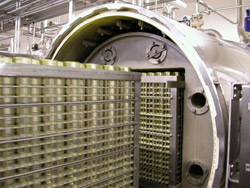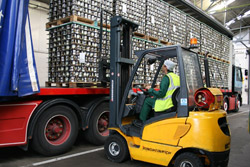 Everything moves at top speed in and around the can filling factories. Fruit and vegetables, for example, are picked at their prime so that no nutrients are lost and taken quickly to the canning factory.
Everything moves at top speed in and around the can filling factories. Fruit and vegetables, for example, are picked at their prime so that no nutrients are lost and taken quickly to the canning factory.
They are washed under fast jets of water, peeled, trimmed, cored and sliced then poured into the empty cans moving quickly along a conveyor belt. The appropriate liquid – water, brine, oil, syrup, fruit juice, or whatever is appropriate – is then poured in to fill the can.
The lid is closed or sealed onto the can, which is tested for airtightness before being sent swiftly off for the most important process – the cooking stage – which is the crux of the canning process. The closed cans are stacked in large cookers that heat them up at the right temperature, under the right pressure for the type of food that is being cooked. Because the can was sealed before this process, any micro-organisms were killed by the heating process.
This means that the food will remain ‘fresh’ with the nutrients locked in until the can is opened. When the cans have cooled they are labelled and sent on their way to the warehouse, from there to the retailer and then on to you at home. The process is much the same for all canned food!
Food from a can is often fresher then ‘fresh food’. This is because it has a shorter exposure time to the atmosphere and it is canned not long after being picked. Compare this with a carrot travelling from a field to a warehouse, from the warehouse to the greengrocer/supermarket, from the greengrocer/supermarket to your vegetable rack, where it may linger for some time before going into the saucepan. All this time nutrients are being lost and the carrot is becoming less and less fresh and tasty.
The can, on the other hand, has the effect of making time stand still. It is as if the progress of time were  suspended when the can comes off the canning line until the moment it is opened ready for eating.
suspended when the can comes off the canning line until the moment it is opened ready for eating.
There is more vitamin C in a canned carrot than in either a fresh or frozen carrot by the time it has been cooked and you sit down to eat it. No added chemical preservatives are necessary. It is the cooking process itself within the airtight container that is the preservative.
Cans are a very strong and therefore safe form of packaging. It is very difficult to tamper with steel so you may be sure the contents are safe and secure. Cans have ‘best before’ dates stamped on to them, but as a guide, most canned foods will keep for up to two years or more and canned meats will keep for up to five years.
© 2025 Canned Food UK, Suite 9-10 Victoria Chambers, 174 South Coast Road, Peacehaven, East Sussex, BN10 8JH - Tel: 01273 585833
HTML Sitemap - XML Sitemap - Privacy Policy - Cookies - Website by Technique